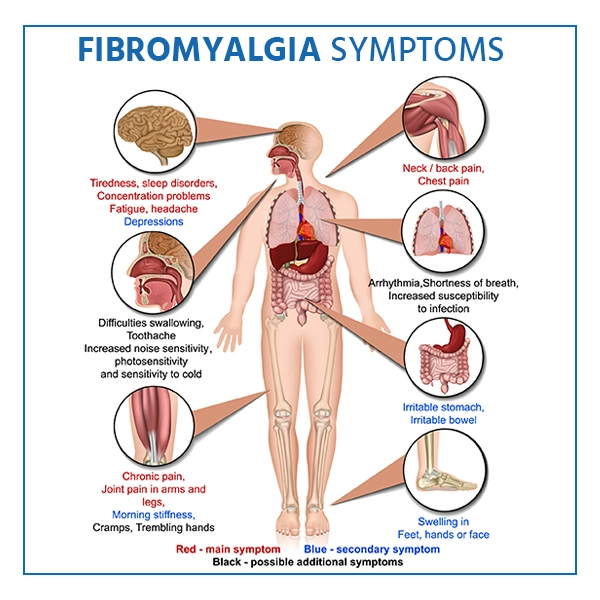Fibromyalgia: Overview
Women are more prone than males to get fibromyalgia. Tension headaches, temporomandibular joint (TMJ) issues, irritable bowel syndrome, anxiety, and depression are common in patients.
Fibromyalgia Symptoms
The following are the most common fibromyalgia symptoms:
- There is a lot of discomfort: Fibromyalgia pain is frequently described as a persistent dull aching that has lasted for at least three months. The discomfort must be felt on both sides of your body, as well as above and below your waist, to be termed widespread.
- Fatigue: Even if they sleep for long periods of time, people with fibromyalgia typically wake up weary. Sleep is frequently disrupted by pain, and many fibromyalgia patients also suffer from other sleep disorders such as restless legs syndrome and sleep apnea.
- Problems with cognition: Fibro fog is a symptom that inhibits one's ability to focus, pay attention, and concentrate on mental work.
Fibromyalgia is frequently associated with other illnesses, such as:
- Irritable bowel syndrome (IBS)
- Chronic Fatigue Syndrome (CFS)
- Migraines and various types of headaches
- Interstitial cystitis, often known as painful bladder syndrome, is a condition in which the bladder is inflamed
- Disorders of the temporomandibular joint
- Anxiety
- Depression
- Syndrome of postural tachycardia

Fibromyalgia Causes and Risks
Fibromyalgia symptoms become apparent when the response of brain and spinal cords change due to frequent nerve stimulation. This shift is caused by an abnormal rise in the amounts of pain-signaling molecules in the brain. Furthermore, pain receptors in the brain appear to establish a kind of memory of the pain and become sensitized, meaning they might overreact to both painful and nonpainful signals. Many factors are thought to have contributed to these developments such as:
- Genetics: Because fibromyalgia is an illness that runs in families, some genetic alterations may make you more prone to acquiring it.
- Infections: Fibromyalgia appears to be triggered or worsened by certain disorders.
- Physical or psychological tragedies: A physical event, such as a vehicle accident, can sometimes trigger fibromyalgia. Long-term psychological stress may also be a factor in the development of the illness.
Diagnosis
Doctors examine 18 distinct places on a patient's body to evaluate how many of them hurt when pushed hard. Apart from this physical examination, a widespread discomfort throughout the body that persists for at least three months confirms a fibromyalgia diagnosis.
Fibromyalgia patients must confirm experiencing pain in at least four of these five locations in the body.
- Shoulder, arm, or jaw in the left upper region
- Shoulder, arm, or jaw in the right upper region
- Hip, buttock, or leg in the left lower area
- Hip, buttock, or leg in the right lower area
- The axial area includes the neck, back, chest, and abdomen
Tests:
The doctor may order additional tests to rule out other illnesses with similar symptoms. The following blood tests may be performed:
- A full blood count
- Sedimentation rate of erythrocytes
- Test for cyclic citrullinated peptides
- Rheumatoid factor is a protein that causes rheumatoid arthritis
- Tests for thyroid function
- Antinuclear antibody is a type of antibody that attacks the nucleus
- Celiac disease serology
- Vitamin D is an important nutrient.
Fibromyalgia Treatment
Fibromyalgia is treated with a combination of medication and self-care measures. The focus is on reducing symptoms while also increasing overall health. Although no single treatment is effective for all symptoms, experimenting with a number of therapeutic options can have a cumulative effect.
- Medications: Medications can aid with fibromyalgia pain relief and sleep improvement. Among the most popular options are
- Pain relievers: Pain relievers are recommended such as acetaminophen, ibuprofen, or naproxen sodium these all are examples of over-the-counter pain medicines.
- Antidepressants: Milnacipran and duloxetine may help with the pain and exhaustion associated with fibromyalgia. To aid sleep, your doctor may prescribe amitriptyline or the muscle relaxant cyclobenzaprine.
- Anti-seizure medications: Epilepsy medications are frequently effective in lowering certain forms of pain.
- Therapies: There are a range of therapies that can help you manage the effects of fibromyalgia on your body and your life. Here are several examples:
- Physical therapy: It is a type of treatment that involves the use of exercises that enhance strength, flexibility, and stamina can be taught by a physical therapist. Water-based exercises could be especially beneficial.
- Occupational therapy: It is a term used to describe a type of treatment a therapist can assist you in making changes to your work environment or the way you do specific duties to reduce stress on your body.
- Counseling: Speaking with a counselor can help you build confidence in your talents and give you coping strategies for stressful situations.
